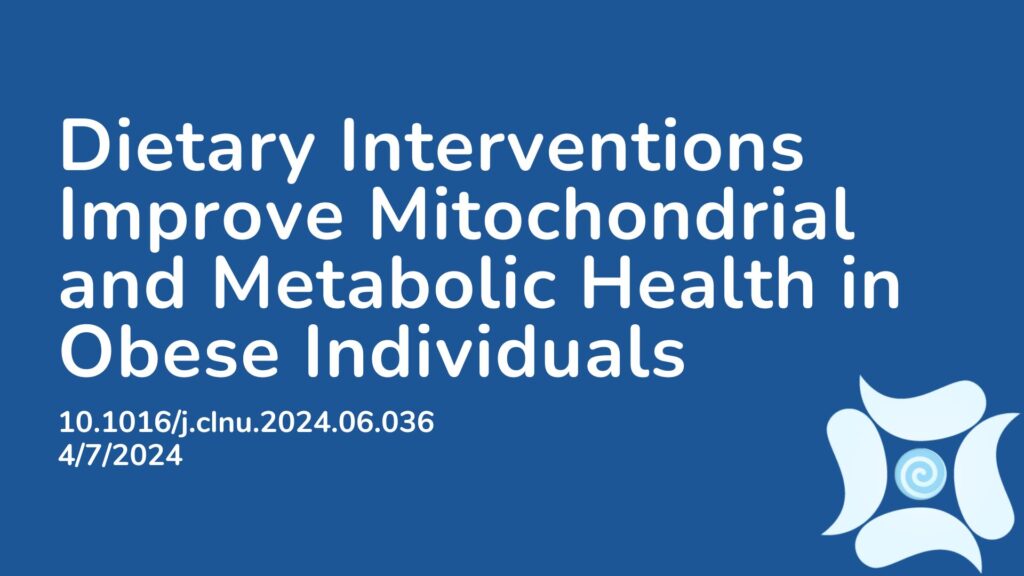Summary:
Diets such as calorie restriction (CR), intermittent fasting (IF), and the ketogenic diet (KD) are used to enhance metabolic health in individuals with obesity. These methods promote weight loss and offer metabolic benefits, including improved mitochondrial function. Mitochondria, crucial for cellular energy production through ATP synthesis, play a pivotal role in metabolic disorders associated with obesity. Dysfunctional mitochondria can exacerbate inflammation and metabolic issues. This study aimed to evaluate how CR, IF, and KD affect mitochondrial function in monocytes, which are white blood cells that protect against germs. The study also examined how these effects correlate with changes in gut microbiota composition following antibiotic treatment. In a randomized controlled trial, individuals with obesity were assigned to one of the dietary groups for one month, followed by an additional month of the same diet combined with rifaximin (an antibiotic). The study measured the oxygen consumption rate (OCR) in monocytes, gut microbiota composition in feces, and other health parameters. Forty-four participants completed the study. Results showed that those on CR, IF, and KD experienced positive effects on the health and function of monocytes. This indicates that these dietary interventions enhanced mitochondrial health and improved the metabolic profile of monocytes in individuals with obesity through gut microbiota modulation.
Abstract:
Background: Mitochondrial dysfunction occurs in monocytes during obesity and contributes to a low-grade inflammatory state; therefore, maintaining good mitochondrial conditions is a key aspect of maintaining health. Dietary interventions are primary strategies for treating obesity, but little is known about their impact on monocyte bioenergetics. Thus, the aim of this study was to evaluate the effects of calorie restriction (CR), intermittent fasting (IF), a ketogenic diet (KD), and an ad libitum habitual diet (AL) on mitochondrial function in monocytes and its modulation by the gut microbiota.
Methods and findings: A randomized controlled clinical trial was conducted in which individuals with obesity were assigned to one of the 4 groups for 1 month. Subsequently, the subjects received rifaximin and continued with the assigned diet for another month. The oxygen consumption rate (OCR) was evaluated in isolated monocytes, as was the gut microbiota composition in feces and anthropometric and biochemical parameters. Forty-four subjects completed the study, and those who underwent CR, IF and KD interventions had an increase in the maximal respiration OCR (p = 0.025, n2p = 0.159 [0.05, 0.27] 95% confidence interval) in monocytes compared to that in the AL group. The improvement in mitochondrial function was associated with a decrease in monocyte dependence on glycolysis after the IF and KD interventions. Together, diet and rifaximin increased the gut microbiota diversity in the IF and KD groups (p = 0.0001), enriched the abundance of Phascolarctobacterium faecium (p = 0.019) in the CR group and Ruminococcus bromii (p = 0.020) in the CR and KD groups, and reduced the abundance of lipopolysaccharide (LPS)-producing bacteria after CR, IF and KD interventions compared to the AL group at the end of the study according to ANCOVA with covariate adjustment. Spearman’s correlation between the variables measured highlighted LPS as a potential modulator of the observed effects. In line with this findings, serum LPS and intracellular signaling in monocytes decreased with the three interventions (CR, p = 0.002; IF, p = 0.001; and KD, p = 0.001) compared to those in the AL group at the end of the study.
Conclusions: We conclude that these dietary interventions positively regulate mitochondrial bioenergetic health and improve the metabolic profile of monocytes in individuals with obesity via modulation of the gut microbiota. Moreover, the evaluation of mitochondrial function in monocytes could be used as an indicator of metabolic and inflammatory status, with potential applications in future clinical trials.
Article Publication Date: 4/7/2024
DOI: 10.1016/j.clnu.2024.06.036



